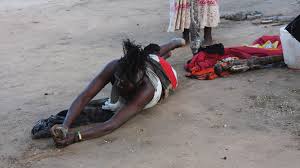THE body of an unidentified man was on Monday last week found with missing parts on an island on Simon Muzenda Road, in a development that left many sh0cked.
The head of the deceased had reportedly been crushed and the chest opened.
The genitɑls had been removed and some parts of the brain were on the street. A used c0nd0m was found beside the body.
The Zimbabwe Republic Police confirmed the case, saying investigations had begun.
Rising cases of suspected ritual murders have left many disturbed throughout the country
Rising cases of suspected ritual murders have left many disturbed throughout the country.
Mystery still surrounds the whereabouts of the head of Tapiwa Makore, whose murder, some three years back, captured the attention of many.
The then-seven-year-old was murdered in Murewa by his uncle Tapiwa Makore senior and Tafadzwa Shamba, and was buried without a head.
The duo went on to be sentenced to death by the High Court, in July this year.
Makore (Junior) was said to have been sacrificed in a bizarre ritual to “boost” a cabbage business.
However, these are not isolated cases.
Last year, in Nyanga, two related seven-year-old minors were found dead in a disused house in the village, with their throats having been cut open and blood drained.
A few months ago, the nation was left in shock after Faith Musonza, who was a Hatfield Spar employee, was brutally killed. Her body was found dumped in a drainage close to her home, with nails and nipples missing.
Early last month, a dark cloud engulfed the Gokwe community after an artisanal miner was arrested for killing his 14-month-old baby, allegedly for the purpose of boosting his mining activities.
Thomas Muzenda is said to have, prior to the murder, approached a self-styled traditional healer, who instructed him to kill his daughter and harvest some body parts.
The authorities have since raised concern over the surging number of ghastly murder cases, most of which are ritual-related.
According to the Zimbabwe Prisons and Correctional Service (ZPCS), the number of people incarcerated for manslaughter rose from 630 to 845 between January and October 2021. By November last year, the figure had further increased to 984.
ZPCS said more than 30 percent of the cases were attributed to ritual purposes.
The Zimbabwe National Statistics Agency reveals that at least 40 percent of the 3 600 murder cases that were documented last year were alleged ritual slayings. Most of the cases are still before the courts.
“The prevalence of murder cases that are suspected to be for ritual purposes is worrying. Conclusive statistics are not readily available but barely two weeks pass by without a mysterious murder recorded across provinces.
“In most of these cases, the bodies are discovered with missing limbs, which begs the conclusion that the parts are harvested for ritual purposes,” said national police spokesperson Assistant Commission Paul Nyathi.
Ritual murder is generally defined as the sacrificial slaying of a human as a propitiatory offering to a deity. Body parts are harvested in the process.
Traditionalist Mbuya Calista Magorimbo opines ritual murder cases are a result of desperation for wealth, spiritual protection and, in some cases, quest for power.
However, she blamed bogus healers for promoting murder and harvesting of body parts.
“Ritual killings have existed since time immemorial, but these days, it is worse, maybe due to economic hardships. What is more disturbing is that even youths are now willing to commit such crimes, which was not the case back in the day. It was mostly the elders, our forefathers, who were accused of such ill practices,” said Mbuya Magorimbo.
Others commit such gruesome crimes in a bid to be healed from “mysterious” diseases.
“Some believe young children’s blood is pure, hence it heals certain ailments,” she added.
But Sekuru Nyanhewe, born Erick Chipeneti, dismisses the misplaced notion. He argues that such rituals do not work as murder is a sin in the local tradition, as well as in some religious circles.
“Murder is a grave sin that cannot attract positive results. Instead, it evokes ngozi (avenging spirit) and yields generational curses,” he said.
Sekuru Nyanhewe notes the disturbing trend, including increasing mental health cases, might be as a result of avenging spirits following crimes committed in the past.
“Sometimes, if you interrogate a murderer, they will tell you that they do not know why or how they committed the crime,” said the traditionalist.
“At times, the crime is committed while one is in a trance. These are manifestations of the grave crimes that were committed by their forefathers.”
The man believed to be Zimbabwe’s most prolific serial killer, Bright Zhantali, is among hundreds of inmates committed to the Chikurubi Maximum Security Prison’s psychiatric unit. They are classified as criminal mental patients.
Zhantali is accused of raping and killing 23 women during a year-long reign of terror that spanned Marondera, Goromonzi, Rusape, Mutare and Macheke.
Anglican priest Father Edgar Sibiya added that mental health issues and poverty are the driving forces behind ritual murders.
He singled out the growing trend of “manjuzu” (marine spirit) as creating problems.
Manjuzu is derived from njuzu (mermaid), a mythical creature that is said to be half-human and half-fish.
The mermaid is believed to be the ruler of the underwater world, and possesses supernatural powers that can make people rich.
“The ‘manjuzu’ craze is affecting even teenagers. It generally entails sniffing snuff, smoking cigarettes and speaking in hushed tones because those who practise it want to remain shrouded in mystery.
“Essentially, we can call it a cult and their demands can even be extreme to the extent of demanding human body parts or blood, which is against biblical principles of valuing the sanctity of life,” said Fr Sibiya.
Psychologist and University of Johannesburg post-doctoral researcher Dr John Ringson identifies several factors leading to ritual killings.
“There are a number of issues involved but it all goes back to the human mind. Economic hardships have left many people mentally unstable. Drug and substance abuse is also another factor contributing to increased murder cases, in general.
“Ritual murders do not work, sometimes things may coincidentally start to work out for someone and they are tempted to believe the rituals are working.
“However, the culprits often end up in sad situations, where they are left swimming in abject poverty or even attracting curses for future generations,” said Dr Ringson.
He criticised traditional healers for taking advantage of mentally unstable individuals.
“Poverty makes people vulnerable and gullible. They are forced to trust myths and rituals such as kuromba, which are believed to yield solutions to their problems.”
While convicted perpetrators are receiving correctional services at various prison facilities, communities also need to be enlightened on the spiritual implications of such activities.
“There is a human element and a spiritual element to this issue, hence it has to be dealt with carefully,” said Headman Zvinowanda Pfumbidzai of Machera village in Hwedza.
“Appeasement rituals should be carried out when the victim is being buried to avoid future problems because an avenging spirit may go on to haunt the perpetrator or their family.”
Traditionally, he said, the wronged family conducts rituals to provoke the spirit of the deceased so that it goes back to the perpetrator’s family for revenge.
“It is advisable that even before or just after the funeral, both parties meet and find an amicable solution to the situation to avert future problems.
“Sometimes, a family may not know that their relative was murdered and the victim may communicate with their relatives in dreams and visions, which then helps locate their dead body,” added Headman Pfumbidzai.
When some body parts go missing and are never recovered, he reckons, the problem will persist.
“At times, some families end up forgiving the perpetrators while others prefer to let the dead fight from the grave.”
He added that, while ngozi still exists, most people are committing the ritual murder crimes for selfish reasons.
“The popular belief is that ngozi often affects future generations, so they do not really care what happens in the years to come, while others argue that it will affect every family member, not only the perpetrator,” he said.
Traditional leaders are now advocating enhanced child protection in their communities by agreeing on alternative means of resolving family disputes.
According to the Zimbabwe National Traditional Healers Association (ZINATHA), issues of ritual killings and how traditional beliefs can mislead people should be discussed at national level.
“Most people are tricked into this inhuman act by callous healers; they are made to believe that killing innocent children, especially their relatives, will bring them good fortunes.
“However, if any of our members is involved in such acts, we have a legal obligation to revoke their membership and have them prosecuted for that,” said ZINATHA.
The downside of this ill-practice in most families is that girls and women end up being a socially deprived group through the practice of forced marriages to appease (kuripa ngozi) the wronged spirit.
However, this is a criminal offence in Zimbabwe, although the fairer sex continues to suffer in silence because the practice is administered at the family level to resolve conflict.
Child protection advocate Chinga Govhati reckons the use of children for any cultural or religious practice is a short-sighted approach.
“Any form of culture or religion that causes and perpetuates harm is not a positive or good one. Most families do not realise that children are their future. When families give away their children in marriage or as payment of a debt, that is an investment lost,” said Govhati.
She notes that children from disadvantaged families are often pushed into forced marriages by their well-off relatives.
“Children are protected by various laws. At international level, the Convention on the Rights of the Child is key and at regional level, the African Charter on the Rights and Welfare of the Child protects children in Article 21, which provides for protection against harmful cultural and social practices.
“At national level, the most relevant document is the Constitution, which promotes holistic child protection in Section 81. Recently, we saw the new Marriages Act criminalising any form of child marriage in Section 3, as well as various other laws that protect children from such actions,” explained Govhati.
Investing in community education, she notes, will help create awareness among affected families and individuals.
“When you listen to stories of girls who escaped such harmful practices and how they are now reinvesting in those families, you realise how ignorance can adversely affect a family.
“It just does not make any sense that someone innocent has to be sacrificed for the actions of another. Issues need to be resolved by other means that do not violate someone else’s rights.”
Source My Zimbabwe










